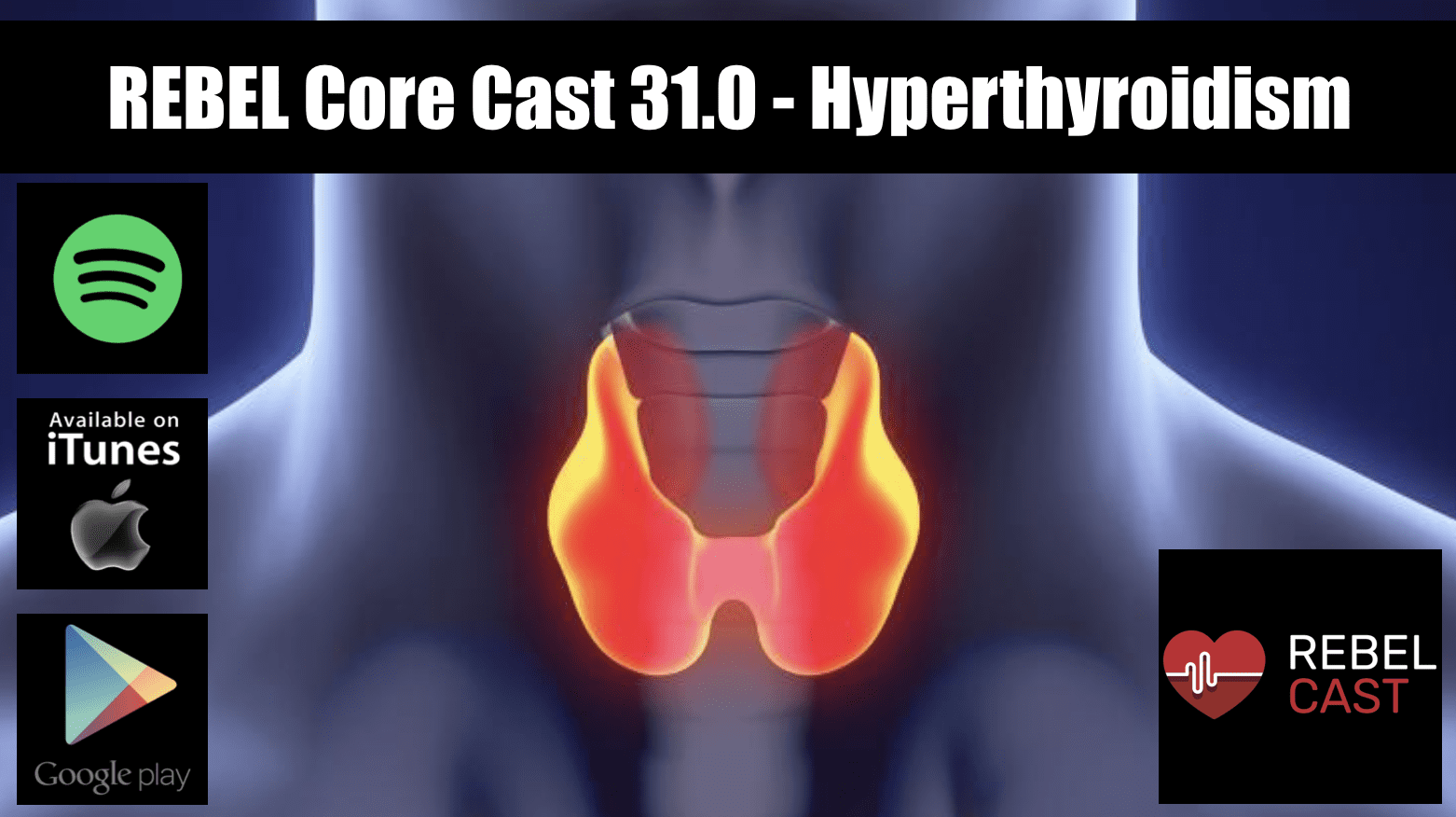

Take Home Points
- Hyperthyroidism can present along a spectrum from the minimally symptomatic to severely decompensated and presentation can vary with age
- If there are a lot of interconnecting systems complaints consider obtaibning a TSH, t3 and t4
- Once you’ve diagnosed hyperthyroidism, dont anchor on it. Look for what might have caused it especially in those with comorbidities
- If the patient is stable and reliable you can discharge them home with Atenolol. Make sure to have the patient follow up with their PCP or Endocrinologist. If, however, you feel uncomfortable doing that or the patient needs more social support, call your endocrinologist on call and get their recommendations.
REBEL Core Cast 31.0 – Hyperthyroidism
Hyperthyroidism
- An excessive amount of thyroid hormone in the body
- Affects numerous organ systems
-
Thyroid hormones are t4 and t3.
- Majority of t3 & t4 is protein-bound as it circulates the body
- Small portion is unbound and is the active form
-
Primary and Secondary hyperthyroid
- Primary -(most common) Excess production of thyroid hormone from either thyroid gland or external factors (medicines)
- Secondary (minority of cases) Excess production of thyroid releasing hormones or TSH
Clinical Features
- Weakness, fatigue, hyperactivity, heat intolerance, diaphoresis, fever, voracious appetite with poor weight gain, anxiety, emotional lability, palpitations, diarrhea, hair loss, gynecomastia, new onset afib, menstrual disorders and myopathy.
-
- Lid Lag (upper eyelid is higher than normal with the globe in downward gaze)
-
Geriatric patients may have different clinical features
- Apathetic rather than hyperactive, tremor, weight loss, shortness of breath.
- Exophthalmos may be present, however severity does not parallel thyroid dysfunction
- Goiter may or may not be present depending on cause of hyperthyroidism
Lab Tests
- CBC, Chem, ECG, CXR, TSH, Free T3 & T4, Pregnancy test
-
-
ECG
- Commonly tachycardia or atrial fibrillation
- Around 50% of patients with hyperthyroid will have resting HR >100
- Afib can be seen in up to 20% of patients
- Atrial tissue sensitive to thyroid hormone thus increased rate of new atrial fibrillation
-
ECG
- Serum TSH level
- Primary hyperthyroid – TSH low, t3 & t4 high
- TSH can also be low due to renal/liver disease and glucocorticoid use
- Secondary hyperthyroid – TSH high because of increased production from pituitary, t3 and t4 will be elevated
When to get TSH
- If multiple organ systems involved
- Unexplained tachycardia
- New onset anxiety, palpitations with no previous history
Treatment and Disposition
- Beta blockers rapidly ameliorate many of the symptoms of hyperthyroidism
-
Recommendation is to start with atenolol 25 to 50 mg daily
- If stable and reliable patient can follow up outpatient with PCP or Endocrinologist
- If patient older or with comorbidities consult endocrinologist for further recommendations
- Ambulatory outpatient evaluation is appropriate for most patients.
For More on This Topic Checkout:
-
LITFL: Hyperthyroidism ECG
- LITFL: Thyroid Function Tests
- EMRAP: C3 Thyroid Emergencies
Shownotes Written By: Miguel Reyes, MD (Twitter: @miguel_reyesMD)
Post Peer Reviewed By: Salim R. Rezaie, MD (Twitter: @srrezaie)
The post REBEL Core Cast 31.0 – Hyperthyroidism appeared first on REBEL EM - Emergency Medicine Blog.
